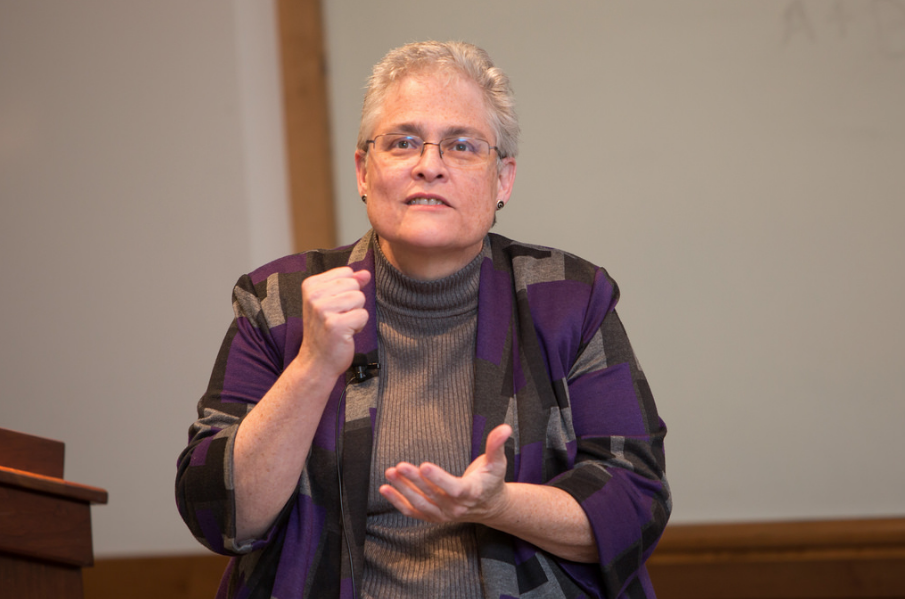
By Charlese Freeman
Student Life Editor
Criticisms and improvement based on the National Center for Higher Education Management System’s recent Strategic System Review as well as “System Redesign” was the topic of discussion for Chancellor Whitney’s town hall meeting last Tuesday.
Dr. Whitney took over as interim chancellor after Frank T. Brogan retired in early September. Whitney visited ESU last Tuesday to discuss some of the new plans to improve the Pennsylvania State System of Higher Education, or PASSHE, school system both financially and academically.
Chancellor Whitney presented the systems plans to help improve some of the financials and leadership issues discussed in the review.
Whitney shared that the state could possibly fund the system an increase of 15 million dollars to ESU for the upcoming school year.
Although $15 million is an increase, it will not put a dent in the anticipated expenses, which will be between $40 and $50 million next school year. Whitney stated that unfortunately when the system is put in to such predicaments, where the state funds less than the expected expenses, it makes things extremely challenging.
“There’s only two other things we can do,” Whitney said. “We reduce our expenses and stop doing stuff that we’ve been doing that we value or we charge the students more money.”
Whitney believes the system should pay closer attention to the relationship between the student and the expenses. Cutting cost does not always solve the problem.
“We use money for good things,” Whitney said. “We use the money for things for like the guy who’s putting the mulching outside, we use money for housing, faculty to teach, health centers, counselors and even copy paper. Things that are important to universities cannot simply just be cut.”
On the other hand, Chancellor Whitney showed appreciation to the Governor’s proposed funding.
Unlike PASSHE, which is estimated to receive $15 million in funding, the University of Pittsburg and Penn State University are estimated to receive no funding from the state next school year.
Whitney moved quickly from topic to topic regarding regulation. Whitney talked about how some state regulations are actually costly comply with.
“Since students are the primary investors we should be regulated less,” Whitney said. “If the state wants to regulate use at 100 percent, they should fund us at 100 percent.”
She also noted ideas of competitive pricing as a way to help with affordability, which one audience member, clapping with approval, was very happy to hear.
The inspiration of the system redesign comes from the June 2017 review criticisms of and recommendations.
One notable criticism in the report mentions how the bureaucracy and politics of the PASSHE system hinders certain aspects of the job.
Whitney suggested the disagreements among the system occupies far more time than necessary, and that time and focus should be placed on the success of the students.
As a result of these systematic disagreements within the system, the schools act as individuals rather than to acting as a system.
Whitney describes the system as “a collection of universities that occasionally talk to each other.”
Whitney also suggested, the politics of the system and the politicians serving on the board as well as a state level need improvement.
She stated that tend to micromanage, which also interferes with the job performance of the school system.
The first priority of the “System Redesign” is student success.
Whitney explains that this is students earning their degrees, then using it for what is helpful to them in their lives
This includes creating equal affordability for all students. The second priority is leveraging all the strengths of all the universities.
According to Whitney, this will help to advance the system.
All the universities have strengths and they should be sharing those strengths with the other universities in the system. Whitney gave an example to further explain the priority. A student as a business major at Clarion University should be able to receive a special experience in biology, which his school does not offer.
Instead of that student leaving Clarion all together, the schools should talk about how they can share their resources to benefit students.
The last priority of the “System Redesign” is changing the approach to leadership and government to achieve the first two properties. Whitney stated that the role of trustees need to be changed so the presidents can have more authority and make more decisions.
To fulfill the plans of the system redesign, the system is utilizing expert task groups of four to six people to fulfil short-term goals.
At the end of her presentation Whitney allowed time for some questions. One question, Whitney bypassed during her presentation, was regarding early retirement. This resurfaced during the session. Whitney discussed phase retirement and the authority of offering buy outs to employees.
Whitney leaned more toward the phased retirement, which allows faculty to gradually move from working fulltime to full retirement.
While Whitney is still chancellor, she plans to continue working on the plans to implement the PASSHE system redesign.
Email Charlese at:
cfreeman2@live.esu.edu

